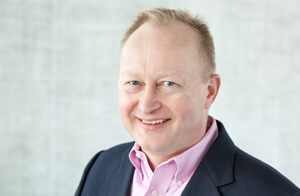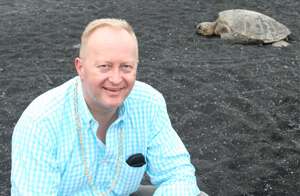Getting to Know the La Piana Team: Lester Olmstead-Rose

This blog post is part of our ongoing series introducing the La Piana team. This week I spoke with Lester Olmstead-Rose. Lester joined La Piana Consulting in 2005 and is based in San Francisco, CA.
Why did you decide to focus your career on the nonprofit sector?
 During college I took a year off from school, and, as I had learned to type, I found a job as a secretary and learned all about big cities living a year in New York. After graduating, I thought I wanted to be a writer and sought a day job to support myself so I could concentrate on that. I considered waiting tables, but ended up falling back on what I already knew how to do — typing. I took a job as a secretary at The Nature Conservancy’s California Field Office. Working for a nonprofit was not necessarily an intentional choice, but I had a natural affinity for the sector. This was confirmed later when I began working at a financial advising firm. It was such an immediate non-fit. Nothing against the folks or the culture there, it just wasn’t for me. I quickly went back to working and volunteering in the nonprofit sector.
During college I took a year off from school, and, as I had learned to type, I found a job as a secretary and learned all about big cities living a year in New York. After graduating, I thought I wanted to be a writer and sought a day job to support myself so I could concentrate on that. I considered waiting tables, but ended up falling back on what I already knew how to do — typing. I took a job as a secretary at The Nature Conservancy’s California Field Office. Working for a nonprofit was not necessarily an intentional choice, but I had a natural affinity for the sector. This was confirmed later when I began working at a financial advising firm. It was such an immediate non-fit. Nothing against the folks or the culture there, it just wasn’t for me. I quickly went back to working and volunteering in the nonprofit sector.
Is there a teacher or mentor that had a significant impact on you?
One of the people I worked for at The Nature Conservancy was Steve McCormick. At that time, Steve worked in land preservation. He later went on to become the CEO of The Nature Conservancy International and later as CEO of the Gordon and Betty Moore Foundation. There was something about him that has always stuck with me: the way he cared about the work he was doing. He loved the land, the environment…it was his natural orientation. But he mixed this passion with the pragmatic. I look to him as a model of someone who is rooted in the mission yet has a practical approach to getting things done.
What trends do you think will have the greatest impact on the sector in the coming 5 to 10 years?
One isn’t really a trend, it is a fact. Health care is at an incredible moment of change. Everyone is asking, “How will this affect us?” Nonprofits are trying to understand how health care reform will impact them and how they must change and adapt to their new reality. We’re seeing new opportunities open up to many organizations, and many threats as well. It’s going to be more important than ever for nonprofits to scan the environment for changes they might never expect, and to stay nimble in responding to what they see.
Another thing is that more organizations approach us already knowing that they need to be more focused. Sorry to say this, but they want to be more strategic about their strategy development! Ten years ago, it was about nonprofits seeking “a strategic plan,” not about what they wanted to get out of the effort. Now organizations are seeing traditional strategic planning as not being particularly useful, but strategic thinking as critical. Many are also aware that they might need to do business planning, to really dig deep into how they will make a change in business model or to launch a new program.
What do you think has caused this change in thinking about planning, in particular?
It is probably driven by 50 different things. Some organizations look 5 or 10 years into the future and realize they are no longer going to be able to do business if they continue operating as is. The Great Recession is also having a long-term impact. How they pay the bills now won’t be feasible in the future.
Perhaps more than anything, I think that there is something in the zeitgeist. Our culture is at a moment in time — largely driven by the example of the tech sector — brimming with the spirit of innovation, re-invention, and entrepreneurship. Nonprofits want to think about how they become different and do better.
Outside of work, what do you enjoy doing?
There are two things that take me away from my day-to-day life. The first is the stage: I love performance of almost any kind, especially ballet and theater. My mother was a dance teacher and all of my siblings performed as singers and actors in high school, so I grew up expecting performance to be part of life. Now I get to bring that skill to my work when I’m facilitating a meeting!
The second is travel. I don’t like long weekends, they just wear me out and throw me off my rhythm. Instead, I like going on long trips to places that challenge me. There are two types of vacations: there are comfort vacations, and then there are challenge vacations. Comfort vacations are the trips where you go somewhere familiar, you know what to expect, and how to behave. These kinds of trips don’t appeal to me. I like the challenge of traveling to a foreign place. How do you pay for your bill? How do you order food? I find that so stimulating and interesting. A very little, but illustrative example of what I like about travel. Many years ago I traveled a fair amount in Mexico. When I first went, I’d go into a restaurant, order confidently (I speak Spanish), eat, and then wait in puzzlement wondering why no one brought me the bill. Here, in the U.S., we expect the bill when we put down our fork. But In Mexico it’s seen as bad manners to give a guest their bill without them asking, as if you are pushing your guest out the door. It’s the itty bitty things, the little differences in day-to-day life that I find so meaningful and interesting.
Is there a particular book or film that you read or watched recently that has really stuck with you?
I saw Tyne Daly in Mothers and Sons on Broadway this spring, and it was amazing. She embodied the emotionally disconnected parent, but made you ache for her to break out. I saw Of Mice and Men during that same trip (yes, star-hopping, that was James Franco), and the inevitable march towards an evil fate was heartbreaking. Those will stick with me. Long-term, Kierkegaard’s Fear and Trembling — a nice high-brow college read — has always been my touchstone. In my mind, the book comes down to a basic revelation that the decisions we are defined by are not made at one moment in time, but rather are repeated acts that must be taken over and over and again until we are defined by their accumulation. The point being that we have to be persistent and consistent in life to make a difference and to make ourselves into the people we want to be.

Comment section